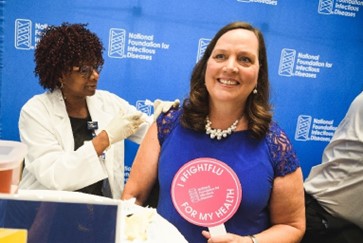
When a loved one is hospitalized, the last thing anyone wants is for them to get an infection while receiving care. Yet, according to the Centers for Disease Control and Prevention (CDC), on any given day, about U.S. hospitalized patients has a healthcare-associated infection (HAI).
An HAI is an infection that develops during or soon after receiving health care or being in a healthcare setting, such as a hospital, clinic, doctor’s office, surgery center, or nursing home. Common HAIs include bloodstream infections, surgical site infections, catheter-associated urinary tract infections, and ventilator-associated pneumonia.
Follow these 6 tips to help you and your loved ones prevent HAIs:
1. Speak Up and Ask Questions
Advocate for yourself and your loved ones by talking with the healthcare professionals caring for you. When a specific treatment is recommended, such as an IV or urinary catheter, ask why it is needed, what the risks are, and when it can be removed. Write down your questions in advance to help remember details. You should feel empowered to ask questions and share any concerns.
2. Keep Your Hands Clean
Make sure that everyone around you, including healthcare professionals, caregivers, and visitors, clean their hands with soap and water or with alcohol-based hand sanitizers when they enter or leave your room and just before touching you or your devices, dressings, or equipment. If you do not see a healthcare professional clean their hands, simply remind them to “please clean your hands, thank you.” If everyone routinely washed their hands, countless deaths could be prevented. This video shows the right (and wrong) way to wash your hands.
3. Be Antibiotics Aware
Antibiotics do not treat respiratory infections caused by viruses, like colds, flu, and COVID-19. Never demand an antibiotic if it isn’t prescribed. When antibiotics aren’t needed, they won’t help you, and the side effects can be harmful. Even when they are needed, antibiotics can still cause side effects and contribute to antimicrobial resistance. Talk with a healthcare professional about the best treatment for your illness.
4. Recognize the Signs and Symptoms of an Infection
Learn how to recognize early symptoms of an infection, such as a fever. If you have recently had surgery, look out for redness, pain, or drainage where the incision was made in your skin, without touching the site directly. Never touch IV lines. Keep cuts and wounds clean and covered until healed. If you had a urinary catheter, look for signs of a urinary infection, such as pain or burning when urinating. Talk with a healthcare professional about what signs and symptoms you should look for and what to do to ensure prompt and proper treatment if you do get an infection. If an infection isn’t stopped, it can cause , a life-threatening medical emergency. Healthcare professionals should immediately evaluate and treat people who might have sepsis.
5. Stay Up to Date on All Recommended Vaccines
Staying up to date on all recommended vaccines can help you stay healthy, avoiding the need for health care in the first place. Everyone ages 6 months and older should get an annual flu vaccine and stay up to date with their COVID-19 vaccines. Talk with a healthcare professional about other vaccines you may need.
6. Don’t be a Dreaded Spreader
Don’t share your germs when visiting someone in a hospital, nursing home, or other healthcare facility. Do not visit a healthcare facility if you don’t feel well. Wash your hands often. Stay home when sick and use precautions, such as wearing a mask where and when required. Masks can help reduce the spread of some germs.
All of us—patients, caregivers, loved ones, and healthcare professionals—play a role in preventing HAIs. Follow these tips to help protect yourself and those you love. To learn more, visit .
Author:
Patricia (Patsy) A. Stinchfield, RN, MS, CPNP is president of the National Foundation for Infectious Diseases (NFID). A pediatric nurse practitioner specializing in vaccine-preventable diseases, she currently has an affiliate faculty position in the School of Nursing at the University of Minnesota. Prior to her retirement, she served as senior director of infection prevention and control at Children’s Minnesota, where she remains on professional staff.